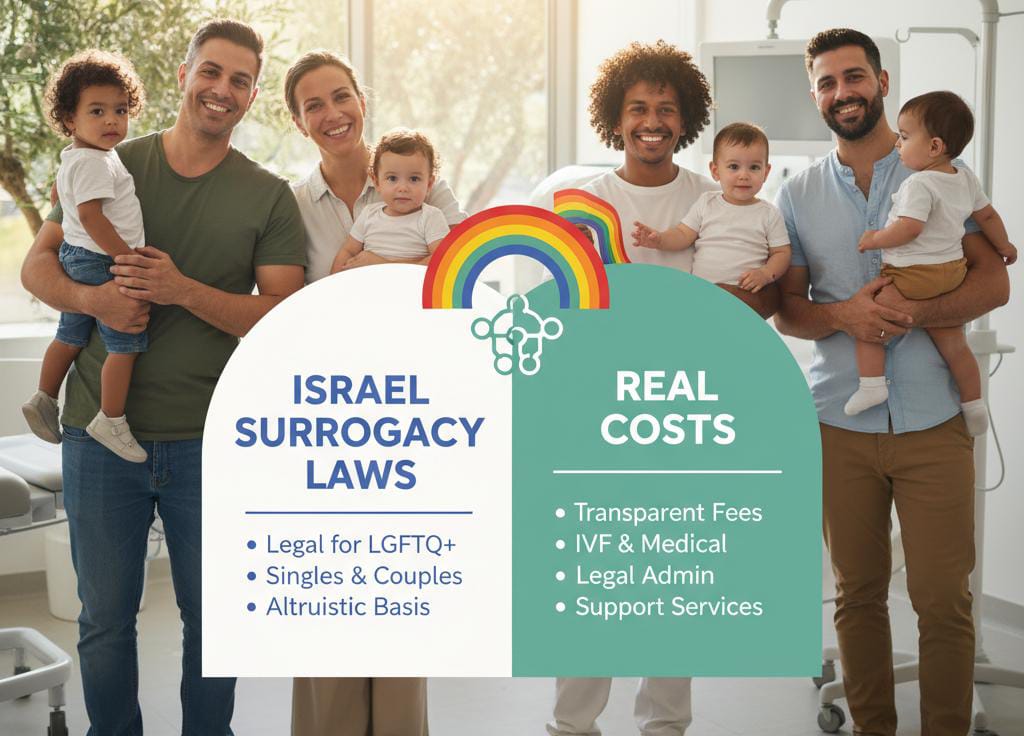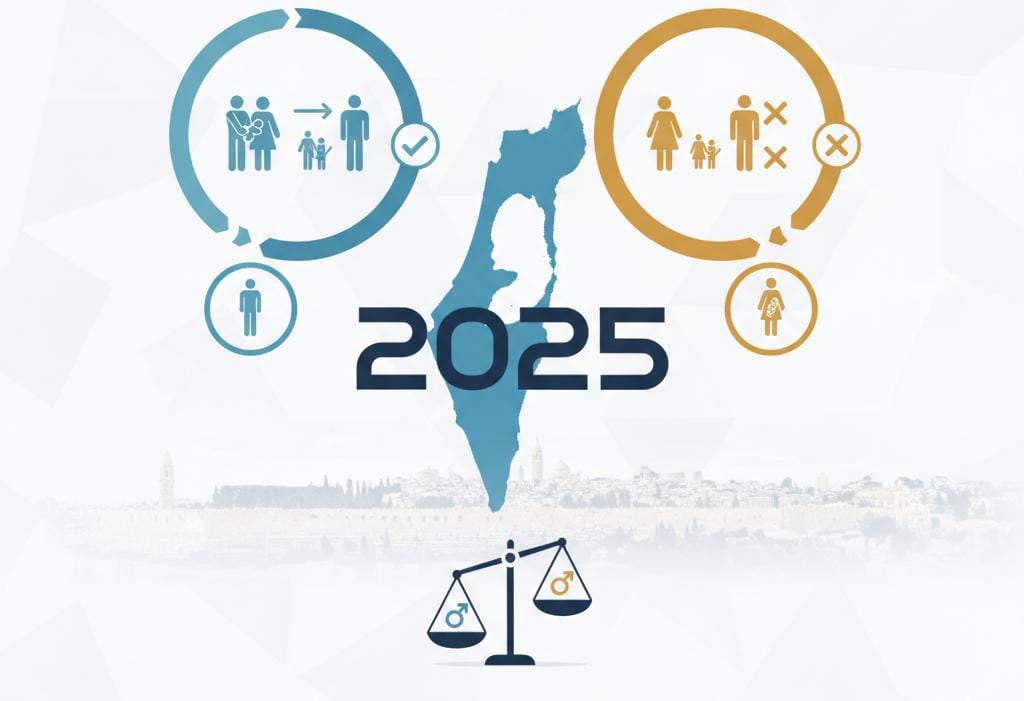Introduction: Surrogacy in Israel – Expanding Access, Growing Hope
Many people want to start or grow a family in Israel; this dream of starting a family has become much easier to reach than ever. Surrogacy in Israel has some of the strictest rules in the world. This is due to the country, which is known for its ethical standards and advanced medical care. After new rules were passed in Israel, it is now possible for LGBTQ+ people, single parents, and different types of families to use surrogacy. Before, it was only for straight couples. This made Israeli surrogacy more open and gave everyone hope. But this journey isn’t always simple. It can be hard to understand the laws, make emotional choices, and surrogacy costs in Israel.
- Book an online appointment: Get a Free Surrogacy consultation
- Call\W:971507812816 Email:
That’s why we’ve created this guide. We’ll guide you on everything you need to know, whether you’re Israeli or international intended parents, like the eligibility rules, success rates, the different kinds of treatment, and how FertilityWorld will help you at every step. Israeli surrogacy is not only possible, but it can also be a truly joyful experience with caring direction and expert knowledge.
Surrogacy Laws in Israel: Who’s Eligible in 2025?
In Israel, people have been talking passionately about surrogacy for a long time. The country has a strong traditional focus on family and a modern medical system, so it has the strictest surrogacy laws in the world. But if you are wondering, “Is surrogacy legal in Israel?” the short answer is yes, and it’s more open than ever before
Legal Milestones: From Restriction to Inclusion
The journey towards surrogacy for everyone in Israel had taken decades and was shaped by changing laws and social values.
1996: The original surrogacy law in Israel was passed. This allows only married straight couples to pursue surrogacy. The system was one of the first internationally regulated ones, but it was only used in a few places.
2018: In this year, a big change was made to make it possible for single women to apply, which is a big step toward equal rights for men and women when it comes to starting a family.
2022: A landmark decision by the Israeli High Court made it possible for single guys and LGBTQ+ couples to enter. This decision marked a turning point in the law’s acceptance of different family arrangements.
Today, Israeli surrogacy law is still very strict and heavily controlled. It’s illegal to do Commercial surrogacy, or pay a surrogate more than the basic amount of reimbursement. To make sure that ethical standards are met, all plans must be reviewed and cleared by the Approvals Committee of the Israeli Ministry of Health.
Eligibility Breakdown- Who Can Do Surrogacy in Israel?
If you’re thinking about going this path in 2025, here are the people who can legally be a surrogate in Israel:
In other words, standard “full donor” embryo cases are not allowed. Instead, the parents-to-be must have a biological connection to the child. Also, surrogates must be Israeli citizens between the ages of 22 and 38 and must pass physical and mental exams.
Real Costs of Surrogacy in Israel
For people in Israel who want to become parents, surrogacy is a legal and moral way to do it, but it costs money. If you want to be a parent, whether you live in Israel or are from another country, you need to know how much surrogacy costs in Israel to make plans. The good news? In Israel, surrogacy is completely selfless (there is no way to make money from it), and surrogates are fairly paid for their time, effort, and medical needs. Besides that, you need to think about the healthcare, legal, and administrative costs as well. Take a look at this easy list of what to expect.
Estimated Surrogacy Cost Breakdown
| Item | Estimated Cost (ILS) |
| IVF Treatment | ₪30,000–₪50,000 |
| Legal & Administrative Fees | ₪15,000–₪30,000 |
| Surrogate’s Reimbursed Expenses | ₪100,000–₪150,000 |
| Donor Egg (if required) | ₪20,000 – ₪40,000 (for gay couples) |
| Total Estimated | ₪150,000–₪290,000+ |
The total cost of surrogacy in Israel typically falls between ₪150,000 and ₪250,000+. But, it also depends on how complicated your treatment is, the needs of the surrogate, and any extra IVF processes like donor egg or embryo freezing. The cost of donor eggs and embryo freezing may include gay surrogacy in Israel, which can add up to ₪20,000–₪40,000 more.
Surrogacy Success Rates in Israel: What to Expect
If you are thinking about using assisted reproductive technologies to become a parent, knowing how likely it is that the treatment will work is a very important part of both your mental and financial planning. Israel is lucky because it is known for its advanced fertility science and highly skilled workers who can help people from all walks of life become parents. The chances of getting pregnant can be different depending on whether you use your own eggs, frozen embryos, or an egg donor from someone else. However, the chances are still good for most age groups and methods.
IVF Success Rates in Israel by Egg Source
The source and quality of eggs used during IVF directly impact success. This is what the latest research data shows:
| Treatment Type | Estimated Success Rate (per cycle) |
| IVF using own eggs | (age <35) 35% – 45% |
| IVF with donor eggs | 55% – 65% |
| Frozen Embryo Transfer (FET) | 40% – 60% |
Gay Surrogacy Success Rate in Israel
Success rates are still high for gay couples or single dads who choose surrogacy with donated eggs and gestational carriers. Because the lab follows high standards and carefully chooses egg donors, the gay surrogacy success rate in Israel is between 50% and 65%, based on the quality of the embryo and the health of the mother. This means that many families who want to have children through male-intended surrogacy or same-sex surrogacy in Israel can usually get pregnant within one or two tries, which is as good as or better than many global standards.
IVF and Surrogacy Success Rates in Israel
| Scenirio Succes | Rate (Per Cycle) |
| IVF with own eggs (under 35) | 35%–45% |
| IVF with donor eggs | 55%–65% |
| Frozen embryo transfer (FET) | 40%–60% |
| Gay couple using donor + surrogate | 50%–65% |
Who Can Be a Surrogate Mother in Israel?
If you want to know who can be a surrogate mother in Israel, the country has strict but clear rules to keep both the surrogate and the intended parents safe. In Israel, surrogacy is done in a very moral way, and only women who match the following requirements can be approved:
Surrogacy for LGBTQ+ and Single Parents in Israel
Israel has made significant progress in expanding family-building rights by offering a supportive legal environment for a variety of families. Surrogacy is now a legal and protected choice, whether you’re a gay couple, an LGBTQ+ individual, or a single parent. Still, there are helpful steps and special things to think about along the way.
Gay Couples and LGBTQ+ Individuals
There was an important court decision in 2022 that surrogacy for gay people in Israel is allowed. Now, LGBTQ+ people and couples can legally have surrogacy, just like straight couples and single women. Male couples must use one partner’s sperm in donated egg IVF to start the process. Surrogacy plans still have to follow Israel’s strict moral rules, which include altruistic-only agreements and approval by the Ministry of Health. Access is protected by law, but the experience of LGBTQ+ surrogacy in Israel may still be different based on how ready the clinic is and how friendly the staff is. Some clinics may be more accepting of LGBTQ+ people than others. Still, a lot of gay and LGBTQ+ families have been able to have children through Israeli surrogacy, and they have been recognized as parents by the law.
Surrogacy for Single Men and Women
Single-parent surrogacy in Israel is also allowed, only if the intended parents get approval from the Ministry of Health’s surrogacy committee. Single women may use a sperm donor if they can’t get pregnant or carry a pregnancy. Single men in Israel, like male couples, must use donor egg IVF in Israel to pursue surrogacy. The Israeli court sees the single parents as the child’s only parents once the baby is born and gives them all parental rights. Israel has clear laws and good medical care, which have made this road possible for people who want to have children on their terms.
Donor Egg IVF & Surrogacy Donor Programs in Israel
Using donor eggs in Israel is often an important part of building a family through surrogacy, especially for intended parents who can’t produce their own eggs. Some types of treatment are common and carefully regulated in Israel. This is an important part of making it possible for more people and couples to become parents. Donor egg surrogacy in Israel offers a medically sound and legally supported way to get pregnant, whether you’re a gay couple, a single man, or a woman with fertility challenges.
There is less domestic egg donation in Israel; most donor eggs come from internationally accredited banks. This ensures that high medical and ethical standards are met. Most of the time, these donor programs are run by partnerships between reputable foreign agencies and fertility clinics in Israel. Frozen eggs are sent to Israel, where the IVF treatment takes place under the watchful eye of very skilled medical teams.
Who Needs Donor Eggs?
Donor egg IVF in Israel is often suggested in the following situations:
- Gay couples and single men who need donor eggs to make embryos for surrogacy. Women with low ovarian reserve, early menopause, or loss of fertility with age can be affected by egg quality.
- For women who have genetic diseases that could be passed on to the child, it is safe to use a donor.
- Donor eggs make it possible for intended parents to use gestational surrogacy and increase their chances of a healthy pregnancy.
Costs and Donor Egg Preparation in Israel
The price of using donor eggs varies based on a number of things, such as where the eggs come from, whether they are fresh or frozen, and how the program is set up. Many people who want to become parents work with clinics in the U.S. or Europe that help them choose a donor, get the eggs, and mail them.
| Service | Estimated Cost (₪) |
| Imported/Frozen Donor Egg Package | ₪15,000 – ₪30,000 |
| IVF Cycle with Donor Egg | Included in the surrogacy total Egg |
| Matching & Legal Coordination | ₪5,000 – ₪10,000 (if separate) |
How It Works in Israel
Most surrogacy donor programs in Israel work with international egg banks or clinics, because there aren’t many egg donors in Israel. The selected eggs are frozen and sent to an Israeli clinic for IVF treatment. Only altruistic donations are allowed, which means that donors are paid properly but not commercially.
There are Clinics and organizations like FertilityWorld which can help you every step of the way, from choosing the ideal donor to final embryo transfer and matching with a surrogate.
Frozen Embryos in Surrogacy: Storage, Use & Legal Steps
For many surrogacy journeys, frozen embryos are quite helpful, especially for intended parents who have already gone through IVF treatments. In Israel, it is both legal and usual to use frozen embryos, as long as the embryo is genetically connected to at least one of the intended parents.
Can You Use Frozen Embryos in Israel?
Yes, frozen embryos can be used in surrogacy cases as long as one of the intended parents is related to the embryo. IVF centre in Israel coordinates the timing of embryo transfer by syncing with the surrogate’s cycle to make sure everything is perfect. There are dedicated cryogenic facilities in Israel where embryos are preserved. The cost of storage ranges from ₪1,000 to ₪2,000 per year.
Frozen Embryos from Abroad
Frozen embryos are legal to bring into Israel, but they need the approval agreement from both the Ministry of Health and the clinic that will receive them. The process involves legal paperwork, proof of genetic relationship, and transportation that meets medical standards. Agencies like Fertility World help manage every step from paperwork to safe delivery.
Whether stored locally or imported, embryo storage in Israel is safe and easy to access for the people who want to start a family through surrogacy, a flexible and proven choice.
Why Some Israelis Choose International Surrogacy?
Surrogacy is legal, moral, and closely watched in Israel, but it isn’t right for everyone. Some people who want to become parents think that the process is slower, there are fewer choices, or it is just too strict in Israel. That’s why more and more people are looking at surrogacy abroad as a safe and sometimes faster way to have a child.
Israeli families looking for foreign surrogacy are increasingly going to places like Surrogacy in Georgia, Colombia, and the United States. Most of the time, these countries have more options, shorter wait times, and bigger surrogate or donated egg programs.
Pros of International Programs (Colombia, Georgia, USA)
Comparison: Israel vs International Surrogacy
| Feature | Israel | International (Georgia, Colombia, USA) |
| Surrogacy type | Altruistic only | Commercial Allowed |
| Who Can Apply | Married couples, LGBTQ+, singles (2022 law) | Varies by country; many allow all family types |
| Egg Donor Options | Limited, often imported | Broad selection, local and international donors |
| Government Approval Required | Yes, strict Ministry oversight. | Often faster or no approval required |
| Total Cost | ₪150,000 – ₪290,000+ | Similar or higher, depending on location |
| Timeline
|
Several months for approval + treatment | Often faster start, depending on clinic capacity |
How FertilityWorld Supports Israeli Families?
With more than 20 years of global experience, FertilityWorld has become a leading agency for Israeli families exploring surrogacy outside of Israel. Although it doesn’t have a clinic in the country, Fertility World offers full-service support by connecting intended parents with some of the most reputable fertility clinics in Colombia, the USA, and India.
They help straight couples, same-sex couples, single parents, and heterosexual couples easily go through international surrogacy. They take care of the medical, legal, and emotional details that mean the most.
Why choose Fertility World?
- Access to surrogacy programs that are approved by worldwide organizations in countries that allow surrogacy
- Partnership with hospitals that have won awards, egg donor banks, and surrogate networks that have been checked out
- Full IVF planning, including making embryos and making sure they are shipped safely from Israel to other countries
- A logistics team with more than 100 cryo-tanks that move biological materials all over the world
- Legal advice for proving parenthood and getting paperwork done after giving birth in Israel
- Senior embryologists who help and teach partner centres around the world how to use tried-and-true thawing methods
Fertility World makes sure that all of its procedures are safe and ethical by being a recognized member of REDLARA, ESHRE, and ASRM. It doesn’t matter if you’re just learning about surrogacy or have frozen eggs in Israel. Fertility World can help you and your partner become parents, no matter where you are.
Final Thoughts: Building Families with Confidence in Israel & Beyond
Sometimes it’s not easy to become a parent, especially if you need to use surrogacy, donor eggs, or the court system. However, you deserve a clear and kind way forward, no matter what your story is or where you come from.
Now more than ever, Israeli families have more choices, including gay couples, single parents, and people looking into donor egg surrogacy. When that happens, reputable organizations like Fertility World can help, support, and be there for you the whole way.
It’s not just about getting medical help; it’s also about building a family with heart, purpose, and care. The most important thing is that you feel supported, understood, and in charge along the way, no matter if that road takes you to a clinic in Georgia, a donor bank in the U.S., or back home to raise your child in Tel Aviv or Haifa.
Because this is your trip, and you can build your family in any way you want. It’s strong. You don’t need to do it by yourself.












